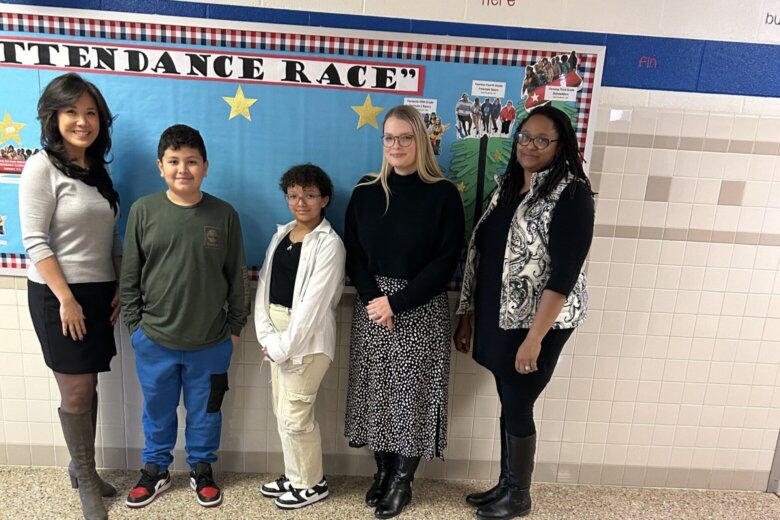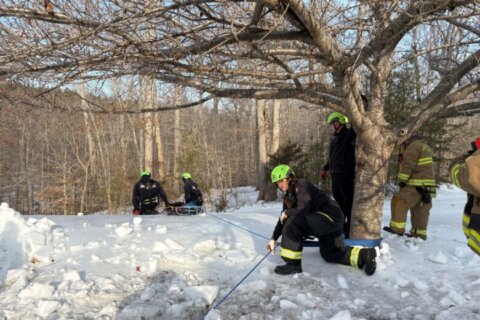
Counselor Lydia Larimore’s plan to address chronic absenteeism at Neabsco Elementary School in Woodbridge, Virginia, started to come together after she observed her own kids.
Larimore has one child who’s a freshman and one who’s a senior in high school. The older one offered to drive his brother to school, instead of making him take the bus. She observed changes over time, as one sibling became more compassionate and the other more understanding.
Just a few minutes together each day proved valuable for both of them, Larimore said.
“I had no idea that a little bit of interaction each day could build a lasting impression,” Larimore said.
She used that same perspective to help launch the Stars Supporting Stars program in October, as part of an attempt to address a rise in absenteeism. For a few minutes each day at the end of fifth grade lunch, those kids connect with a younger mentee at the school, either a student known to be absent often or a peer who needs the extra support.
Leaders at the Prince William County school said the approach has paid off in helping students hold each other accountable and feel excited about going to class.
“We’re seeing the effects of it in our grades, in our students’ behaviors and students’ sense of belonging,” said Allison Fultz, also a counselor at the school.
The program officially launched Oct. 2, and Larimore said the idea came together the week prior.
In the first quarter of the last school year, Larimore said 25% of the school’s more than 600 students were chronically absent, meaning they had already missed 10% or more of the school year. That figure dropped to 12% by the first quarter of the current school year, and by this year’s winter break, some 90% of students attended school regularly, she said.
But this year, after winter break, the number of students missing class didn’t increase, as it did the year before. Larimore suspects the mentorship program is having an influence.
The students’ exchanges only last for about a minute or two, and often include talking about the school day or other things going on. School staff pair the students, and the program is expanding.
In the first round of mentor-mentee sessions, Larimore said there were 24 mentors and 25 mentees. In the second round, there were 35 of each. In the upcoming round of meetings, which start next week and will last into February, the school is hoping to have 36 to 40 of each.
Mentors report back to school staff on how their mentees are doing.
“What we’re noticing now is when our students do come to school more regularly, that their grades are going up,” Larimore said. “And we’re also noticing friendships and bonding, and also families are coming to us more regularly for help.”
Fifth grader Leila Pitt said she’s been a mentor for both rounds so far, often asking about her peers’ day, what could have been better and how they’re feeling.
“It makes them feel like they can be safe at school,” Pitt said. “They know that people want them to be there. Their friends want to be there for them.”
Outside of staying home due to illness, Pitt said sometimes students stay home because “something at home really isn’t well, so their mood isn’t that well, so they don’t want to take it out on other people.”
Jason Contreras, meanwhile, said he wanted to become a mentor to help make his peers more comfortable.
“It makes them feel happy because they know someone who cares about them,” Contreras said.
The initiative is helping to motivate students to keep coming to school, but it’s also empowering older kids to become leaders, Fultz, the guidance counselor, said.
“Attendance isn’t just the counselors doing the work,” Fultz said. “It’s teachers reaching out to families, kids holding their peers accountable and saying, ‘Hey, I missed you today. Where were you?'”
The school, Fultz said, has seen a “dramatic decrease” in chronic absenteeism, which she described as a significant improvement.
“Students who I see struggle to come to school, they don’t feel like they belong,” Fultz said. “They feel like they don’t have friends that care about them, or that their teacher doesn’t notice them enough, and then they don’t feel like they want to come to school.”
Get breaking news and daily headlines delivered to your email inbox by signing up here.
© 2024 WTOP. All Rights Reserved. This website is not intended for users located within the European Economic Area.









